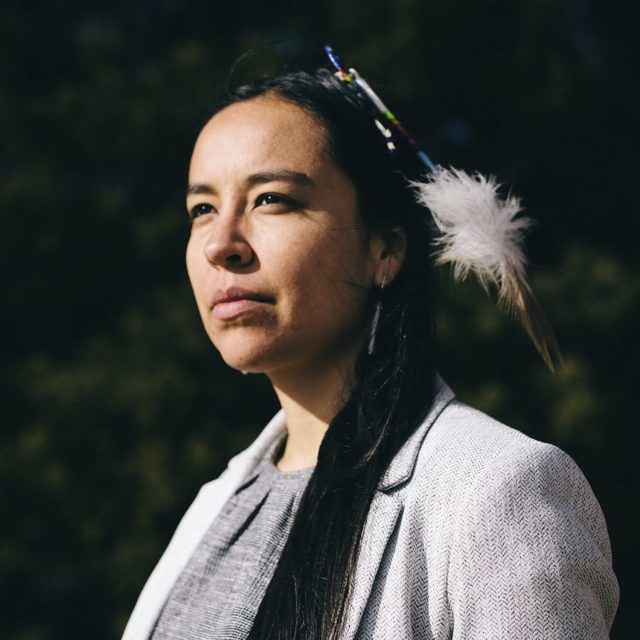Lyla June gives the saying “from the ground up” a poetic – and almost literal – meaning. The Indigenous public speaker, human ecologist, and artist visited UW-Madison as a part of the Wisconsin Union Directorate’s (WUD) Distinguished Lecture Series.
The free event series is designed for distinguished voices to share how they break barriers, combining both personal experiences with expansive descriptions on the qualities needed to jump-start a new way of living. June’s perspective on advocacy for Indigenous rights and stewardship for proper agricultural practices comes from a place of love – skills she learned from her loved ones, and from the soil beneath us.
June is of Diné (Navajo), Tsétsêhéstâhese (Cheyenne) and European ancestry from Taos, New Mexico. She spoke fondly of her homeland, of the many lessons it taught her and the tribulations that made her appreciate the simple act of living.
“I started doing drugs and alcohol by the time I was 11,” she said. “By the time I got to Stanford University, I was an addict and an alcoholic. Anything I say here is because of the miracles that the creator did to help me get sober,” she said, celebrating her ten months of sobriety next month.
“An Evening With Lyla June: The Power of Indigenous Knowledge in an Age of Neocolonialism”, focused primarily on a facet of her TEDxKC discussion about restoring Indigenous sustainable land management practices, as well as how important saving Indigenous languages are in order to preserve these methods.
June began the lecture with a poem, “because I think the language of poetry can teach more than a PowerPoint ever could,” she said. She spoke eloquently of the self-evident beauty in nature, and how every living creature is able to recognize it once the language is understood. “My grandmother knew this language,” she preached, “for she spoke it in a way that grows out of desert floors, redstone arms reaching up into the sky, praising creation for all of its brilliance.”
She wants to correct the narrative surrounding Indigenous land management. Methods such as the use of fire for routine Chestnut tree management – which helps support reproduction grounds for large oaks against competing vegetation and maintains a healthy, moist topsoil – are still sophisticated enough to be modern practices. The American Chestnut tree was once a prominent species that stretched from the top of Maine all the way down to Georgia, sometimes towards northern Florida. June presented pictures of massive, almost folkloric trees that towered over a small colonial-looking family.
“Right now the American Chestnut tree is almost completely extinct due to a blight that wiped it out,” June said. “Americans did not know how to manage the forest correctly.” Not only do these practices maintain the tree itself, but it’s also the most effective way of guaranteeing a healthy symbiotic relationship between wildlife and plants, June said.
One example she gave was the growth of bison populations. She used the Phoenix, a mythical fire-based bird born from ashes of an old fire, to describe the bison. The stereotypically known prairie animal benefited off of burnt and manicured prairies so greatly that its population actually expanded as far south as Georgia, and as far east as Pennsylvania. These are strong regenerative practices that can also protect us humans.
“The wildfires we’re seeing in the U.S and Australia and other parts of the world are not simply due to the climate crisis,” June explains. “They’re also due to the prohibition of Indigenous fires, which has led to a huge buildup of vegetation – fuel for fire essentially – over the centuries.”
Creating forage for the land she praises – both literally and figuratively – is June’s purpose. To bring life back to ideas that have been purposefully dried up and burnt down by capitalist “quick money” practices is a process that – literally – starts from the ground up. She recounts to the lecture audience how she nearly failed an economics class due to her complete – and rather purposeful – disregard for its general idea.
“I thought these people were crazy,” June explains, profit maximization being an idea she never considered. “And they thought I was crazy.
“You know, how do you expand the habitat for your food?” June continued. “It’s not a food system, it’s a kinship system. How do you make more area for the buffalo? Instead of caging your food or building a corral around it…why don’t you just make a home for it? And have it come to you? How do you make a home for life?”
Reciprocity is born of safety and trust, and June believes that the steps to get to that level of understanding is all about self-healing. “Kinship, again, holistic management…not just managing a small field or a single farm, but managing an entire country…these thousand-year-old systems work, and we must fight fire with fire.”




























